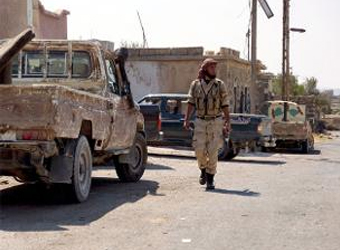More than 65,000 people have been forced to flee fighting in northern Syria, ravaged in recent weeks by dual offensives on the Islamic State (ISIS) group, the United Nations said Sunday.
The UN’s humanitarian agency (OCHA) said that tens of thousands of people have left their homes in northern Aleppo province, particularly around the former militants’ stronghold of Al-Bab.
“This includes nearly 40,000 people from Al-Bab city and nearby Taduf town, as well as 26,000 people from communities to the east of Al-Bab”, OCHA said.
Turkey-backed rebels seized Al-Bab from ISIS on February 23 after several months of fighting.
OCHA said the nearly 40,000 people displaced from the town fled north to areas controlled by other rebel forces, and that the high contamination of unexploded bombs and booby traps set by retreating militants was complicating efforts to return.
And since February 25, OCHA said, another 26,000 people fled violence further east, where Syrian government forces supported by Russian air power have also been waging a fierce offensive against ISIS.
Many of those fleeing the violence sought refuge in areas around Manbij, a town controlled by the US-backed Syrian Democratic Forces (SDF).
An AFP correspondent in Manbij said that long queues of families were still forming at checkpoints leading to the town on Sunday.
Pick-up trucks full of children and women wearing full black veils were being searched individually by SDF personnel before being allowed to enter.
The Syrian Observatory for Human Rights monitoring group said Saturday that 30,000 people had been displaced by the government’s offensive on ISIS militants.
The Russian-backed push is aimed at IS-held Khafsah, the main station pumping water into Aleppo.
Residents of Syria’s second city have been without mains water for 48 days after the militants cut the supply. Regime forces retook full control of the city last year.
On Sunday, Russian and regime warplanes bombarded ISIS positions in support of Syrian troops, which had advanced to around 14 kilometres (nine miles) from Khafsah, the Observatory said.
Since war broke out in Syria in March 2011, more than half of its population has been forced to flee their homes.
Aleppo province hosts tens of thousands of displaced Syrians, many in camps near the Turkish border.
“We left our homes with nothing: no fuel, no bread. Our children are starving,” said Jumana, a 25-year old Syrian woman who fled the clashes with her two children.
“Daesh (ISIS) was shelling us, the airplanes were hitting us. Our children were terrified. We were barely able to save ourselves,” she told AFP on the outskirts of a village around 18 kilometres (11 miles) from Manbij.
Ibrahim al-Quftan, co-chair of Manbij’s civil administration, told AFP on Saturday that fleeing families were suffering very difficult circumstances.
“The numbers of displaced people here are still rising because of the clashes between the Syrian regime and Daesh (ISIS),” Quftan said.
Syria’s multi-front conflict is approaching its seventh year and has killed more than 310,000 people, defying international efforts to stem the violence.
Another round of UN-brokered peace talks ended Friday in Geneva. The negotiations between government and rebel delegations limped along for several days but stumbled on the issue of counter-terrorism.
Russia began its air war in support of President Bashar al-Assad’s forces in September 2015, and its help has been instrumental in re-capturing large areas from IS and rebels, including Aleppo and the famed desert city of Palmyra, which fell from militants’ hands last week.
Rebel backer Turkey sent its own troops into Syria in August to fight both ISIS and Kurdish forces, some of which Ankara considers terrorists.
Source: AFP


